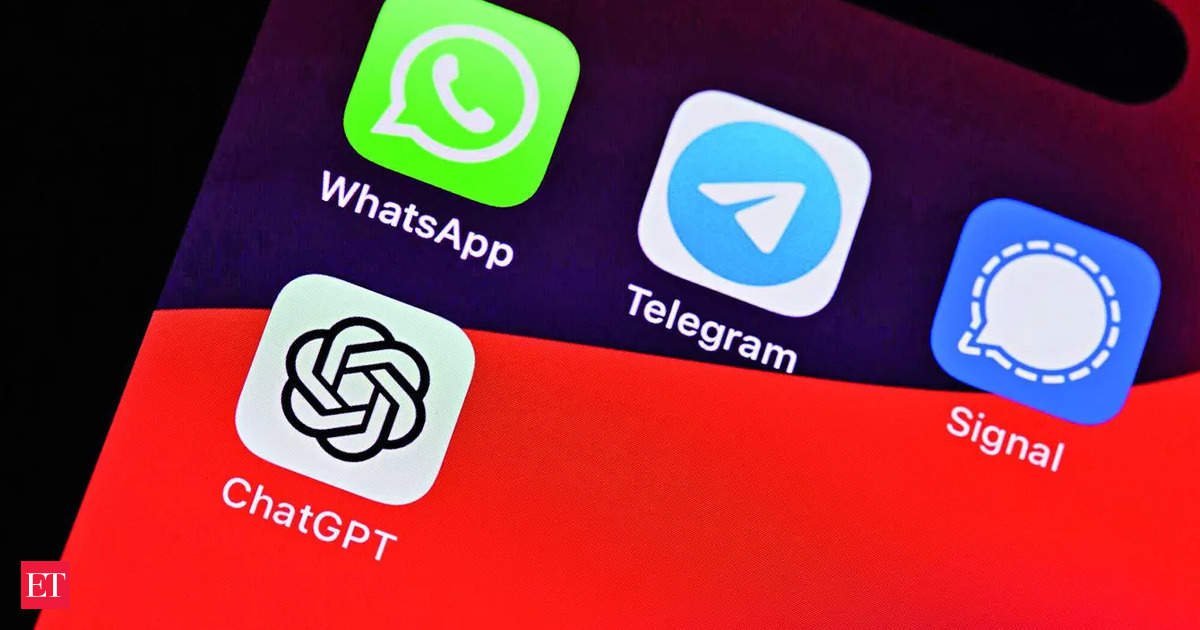The clarification comes amid a renewed push by telecom companies to get authorities to regulate communication apps, seeking the same-service, same-rule principle. Operators are also interpreting that the definition of telecommunication in the new Act includes communication apps, a view rejected by the OTT players that say they are already regulated by the Information Technology Act.
“Interpretation of the definition is not as simple and that is why different stakeholders are understanding in their own way. Things will be clarified after some time when all the rules under the Act are notified,” an official told ET. “DoT though does not intend to regulate OTT players.”
As per the Telecommunications Act, 2023, “telecommunication” means transmission, emission or reception of any messages, by wire, radio, optical or other electro-magnetic systems, whether or not such messages have been subjected to rearrangement, computation or other processes by any means in the course of their transmission, emission or reception.
An electro-magnetic system means a switch must be involved, which is independent of the network, for transmission of the message, another official said. “But in the case of OTTs, the message is transmitted through data packets, and the switching is done for the packets, which the customers are already paying for. The service is being provided by the telcos by taking their packets.”
The telecom Act has given a broader definition around telecommunications, but the Act is primarily meant to regulate licensed telecom operators, say officials. From a security point of view, the government will see how such apps can be regulated and under which Act. “The Ministry of Electronics and IT will take a call if the apps will be regulated under the Digital India Act or some other legislation,” said the first official.In a recent submission to the Telecom Regulatory Authority of India (Trai), the Cellular Operators Association of India (COAI), representing the country’s private telecom operators, claimed that OTT communication services were “covered under the new Telecom Act as an access service”.DoT officials said these issues will be clarified to a point once the Trai gives its recommendations on whether to regulate communication OTTs.
Trai in July last year came out with a consultation paper on the regulatory mechanism for OTT communication services and selective banning. This came after DoT asked the regulator to reconsider its 2020 recommendations wherein it had proposed that OTT services need not be regulated. “We will give our recommendations, and which Act it becomes a part of and which ministry or which regulator deals with it, is a separate matter,” Trai chairman Anil Kumar Lahoti said recently.
The COAI, in its response to the Trai consultation paper, had reiterated the telcos’ view that players providing OTT communications services should be brought under the licensing framework.
Telcos have also renewed their demand seeking a fair share of OTT revenues. “It is evident that the exponential growth of OTT services and unregulated proliferation of communication services is creating a heady mix of security threats,” and also an uneven playing field for “regulated and law-abiding service providers”, the association said in a statement, explaining its rationale for demand that such apps should be regulated like operators.
App makers though say their services are not the same as what telcos offer, and thus can’t be regulated like them.
The Broadband India Forum (BIF), representing tech companies and app makers, said in a statement that bringing OTT services under the Telecom Act is in “complete violation of Article 14 of our Constitution, which guarantees equal treatment only to persons or entities who are similarly situated. Importantly, equal treatment to unequals is nothing but inequality. To put both categories at par is wholly unjustified, unconstitutional and arbitrary, being violative of Art.14. Comparing OTT services to telecom services of voice and SMS is completely erroneous and overlooks the vast and critical differences between the two categories.”
BIF president TV Ramachandran said that the proposal by telcos on a revenue share from OTT players generating large traffic was a continued attempt to mislead their own customers and the general public by creating untenable arguments for unacceptable quality and trying to impose additional financial burdens on other sectors while masking the inefficiencies and monopolistic behaviour within the telecom industry itself.
“These moves, if allowed, will ultimately harm consumers, stifle competition, and hinder the growth of the digital ecosystem in India,” he claimed.





